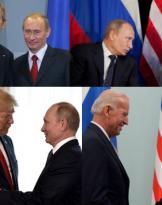The crisis between Russia and Ukraine that has characterized Eastern Europe for a year now constitutes one of the greatest factors of instability for security in Europe. Instability involving a wide spectrum of interests: energy, commercial, financial, political and security. Of particular importance are the issues related to energy security and those related to trade between Russia and the European Union which is a factor of no less importance for the actors in question.
However, although important, the problems related to energy supply and trade constitute part of a broader framework that invests the overall strategy of the Russian state, taking into consideration, therefore, its behavior with respect to the current crisis.
The Russian-Ukrainian crisis can be analyzed by focusing the analysis on the economic factor, ie territorial, elements that surely provide a correct reading of a part of the factors at stake. In order to fully analyze the strategies implemented by the actors in Eastern Europe, it is necessary to work on different scales of analysis: not only the economic and territorial interests, but also the history and culture of a State are factors of capital importance to understand strategy and behavior.
At this level of analysis, the crisis between Russia and Ukraine - arising in relation to the geostrategic location of Ukraine, in terms of an agreement, joins the EU which could have implied its entry into the North Atlantic Treaty Organization - it must be placed in the context of the complex geopolitics of Eastern Europe. Historically characterized by the presence of state entities lacking in linguistic and cultural homogeneity whose political action has been influenced from time to time by the different postures of the regional powers and the national interests pursued by the actors at stake, Eastern Europe continues, precisely for this unstable configuration, to be a decisive space for the stability and security of the whole of Europe.
Given the absence of ethnically and linguistically homogeneous nation-states, the regional powers have historically exercised stabilization or destabilization action according to national interests and the strategies they intended to pursue. Russia has always been a decisive actor in determining the geopolitical structure of the sector. Given the vastness of the borders, Russian foreign policy necessarily operates along different lines that can be schematically summarized: relations with its eastern neighbors and in particular with China and India; the relationship with the former Soviet Republics that can be analyzed as a specific vector of Russian foreign policy; the relationship on a global scale of cooperation and conflict with the US; and finally the one with the countries located on its western borders.
The context of Eastern Europe in relation to Russian foreign policy and the role of Europe
As far as it is relevant to our analysis, which deals with the dynamics underway in the Russian-Ukrainian conflict, it should be noted that Eastern European spaces have always been of paramount importance for Russian foreign policy, which perceive as a determining factor for their own security the existence of "buffer" areas able to protect the borders with the European West.
 In fact, the Eastern European space plays a major role in the history of Russian foreign policy: strategic for the purposes of internal protection from foreign invasions, and at the same time, border area - passage to the West of which Russia is necessarily interlocutor in determining the balance and spheres of influence in Eastern Europe. A priority of Russian foreign policy has therefore always been the stability of the western borders which, through direct or indirect influence on neighboring states, guarantee stability and internal security. In the meaning proposed here, the concept of security is to be understood in a historical and dynamic sense: it changes with the changing historical cultural and political conditions of a country and is in direct relation with a determined spatial and cultural configuration.
In fact, the Eastern European space plays a major role in the history of Russian foreign policy: strategic for the purposes of internal protection from foreign invasions, and at the same time, border area - passage to the West of which Russia is necessarily interlocutor in determining the balance and spheres of influence in Eastern Europe. A priority of Russian foreign policy has therefore always been the stability of the western borders which, through direct or indirect influence on neighboring states, guarantee stability and internal security. In the meaning proposed here, the concept of security is to be understood in a historical and dynamic sense: it changes with the changing historical cultural and political conditions of a country and is in direct relation with a determined spatial and cultural configuration.
This aspect of the concept of security helps us to understand how, without the consideration of the perception of security that a State has, it is not possible to understand its strategy and behavior. This perception is also permeated by the specific cultural characteristics of a state. Therefore an effective context analysis must integrate the cultural characteristics that inform a state actor in order to understand his behavior. Failure to understand a country's civilization or foreign policy culture can lead to serious strategic errors.
In this historical key, the role played by Eastern Europe in relation to the security concept of Russia must be understood. Failure to understand civilization or a country's foreign policy culture can cause serious strategic errors.
Historically, the Eastern European sector constitutes an area of direct Russian influence. Characterized by a close social, cultural and economic integration that has taken place among the populations, with for example the presence of reciprocal ethnic minorities, the area of Eastern Europe sees Russia as a Hegemonic state in bilateral relations with the countries of its neighbor abroad. A further element that can help to understand Russia's behavior is given by the sense of specialty with which Russian history is perceived. From this sense of specialty derives a peculiar conception of the role of the country in the world as a vector of universal civilization. This perception was historically expressed with the idea of the "third Rome" which, starting from 1453, indicates the universal role of Russia as guardian of a peculiar civilization and "heir" of ancient Rome. Above all, this vision of Russia as a bulwark of a specific culture has developed in reference to the country's role as a depositary nation and protector of the Christian Orthodox faith.
The Orthodox faith, in particular, is one of the elements that together with the language, most characterize the Eastern European states, determining in fact the existence of a common civilization that has Russia as its center of irradiation. Given the conception that Russian civilization and culture has of itself, we can deduce how the behavior of state actors, even in crisis contexts, goes far beyond the purely economic or power dimension with which, often, it is limited. In relation to the notions outlined above, we can analyze Russian geopolitics in Eastern Europe within the framework of culture and traditional guidelines of Russian foreign policy.
Russia is at the center of a sphere of influence which, from a political and cultural point of view, includes Belarus and Moldova, Ukraine, Serbia and Bulgaria, includes the Caucasian area and extends to Kazakhstan.
As a regional power, Russia develops its own external security doctrine, in reference to its strategic interests.
In particular, Ukraine, as a neighboring state with Russia, has obvious strategic implications for it. It therefore has a key role for Russian security, but also a role that is historically and culturally of primary importance for the Russian state.
In modern history since the 1654, the Ukrainian territory has been the subject of various spheres of influence, including the Polish and Austro-Hungarian and Russian spheres. Historically a frontier land between East and West, Ukraine has integrated different ethnic and religious groups, like all the countries of Eastern Europe. This arrangement, despite the prevalence of the Ukrainian identity, has led to an uneven configuration of the country that has affected its internal stability and international role.
As known, Ukraine is characterized by deep ethnic divisions whose main one is between Russians and Ukrainians.
This division is articulated on an east - west axis. The country can be divided into a western sphere, the majority of which is Ukrainian, and an eastern one, mainly populated by Russians or Russian-speaking populations.
On the basis of this ethnic fracture one can find one of the interpretative axes of the current geopolitical conflict.
The combination of the possible strategic readjustment of Ukraine in a Western key, in connection with a more assertive Russian foreign policy, has reactivated ancient and profound geopolitical traditions and the bonds of civilization that have become acute again in the current crisis. Russia's behavior with respect to Crimea and eastern Ukraine is to be found in the "universalist" cultural and geopolitical tradition of Russia as the protector of the Slavic peoples characterized by the common Orthodox faith. Obviously, this aspect must be integrated with elements of a strategic nature linked to the risk for Russian security of an inclusion of Ukraine in the Western sphere of influence. A further element able to support what has been said regarding the decisive role of geography, history and culture as decisive factors in the political, strategic and overall structure of states is provided by the recent establishment of the Eurasian Union between Russia, Belarus, Kazakhstan, Tajikistan and Kyrgyzstan. It is evident that there is a willingness on the Russian side to affirm its role on a regional scale and this strategy also passes through lines of cultural division.
 The illustrated scenario has obvious implications for the security of European countries. The destabilization of a crucial border such as that of Eastern Europe represents a problem of the utmost importance for the countries of the European Union. The EU has a decisive role in the current crisis. Through the conflict in Ukraine the strategic and territorial structures of Eastern Europe are being redefined.
The illustrated scenario has obvious implications for the security of European countries. The destabilization of a crucial border such as that of Eastern Europe represents a problem of the utmost importance for the countries of the European Union. The EU has a decisive role in the current crisis. Through the conflict in Ukraine the strategic and territorial structures of Eastern Europe are being redefined.
Within the scenario outlined above, operating on multiple scales, the role of the European Union is to be placed, which is called, within the limits of the common security and defense policy, to develop its own security policy capable of contemplating the complexity of the factors at stake in order to develop an overall strategy in relations with Russia and Ukraine that will necessarily have to take into account the cultural factor for understanding the methods of action and strategies, otherwise the inability to work effectively in the context of current crisis scenarios.
Ciro Luigi Tuccillo
(photo: Russian presidency archive)












